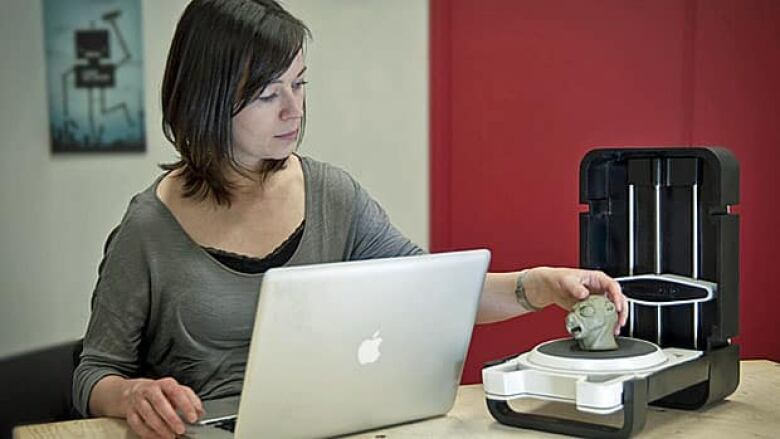How practical and legal is 3D scanning?
Affordable 3D scanners now available for home use

Last June, I lost several hours of my life to a 3D printer.
It began after I downloaded the plans for a smartphone kickstand from Thingiverse, loaded them onto a MakerBot, and hit print.
I was instantly mesmerized. The musical whirr of the motors. The smell of freshly extruded ABS plastic. The cool glow of LCD display. It felt like the future.
But after I pried my fourth or fifth smartphone kickstand off the MakerBot's still-warm platform, the novelty wore off. You see, 3D printers aren't particularly useful unless you have something meaningful to print. And I didn't.
That's part of the problem Drew Cox and Adam Brandejs want to address with their Matterform 3D scanner.
In some ways, 3D scanning is the flip side of 3D printing. Whereas a 3D printer can turn digital files into physical objects, a 3D scanner can turn physical objects into digital files.
While professional 3D scanning technology has been around for years, Cox and Brandejs's Matterform is handbuilt for the hobbyist market. And hobbyists have responded by opening their wallets.
'The camera captures the data from the lasers as it's turning, and turns it into a 3D model that you can use on your computer for animation, design, or if you want to print it out in 3D.' Drew Cox, Matterform
Matterform's crowd-funding Indiegogo campaign raised $471,000 last monthmore than six times its original goal.
Matterform is not alone, though, in targeting the hobbyist market: Makerbot Industries recently announced a 3D scanner of its own, called the Digitizer.
The Matterform is scheduled to ship this summer, with the starter model priced at $599. But I met up with Cox and Brandejs in their Toronto studio for a sneak peek.
At first glance, the scanner could be mistaken for a portable record player. A user places an object on the rotating platform, and "there's a camera and a couple of lasers that shoot out towards the object," explains Cox.
"The camera captures the data from the lasers as it's turning, and turns it into a 3D model that you can use on your computer for animation, design, or if you want to print it out in 3D."
The software I saw can capture a point cloud ("a mass amount of points in three-dimensional space"), but can't yet convert that point cloud into a mesh that can be used by 3D printers.
"This is still beta," Cox explains.
His partner Brandejs sees several potential uses for this technology. "We've gotten a lot of interest from dentists," he says, "to take moulds of people's teeth, digitally scan it, and then just send it offinstead of having to ship the physical moulds."
He also sees potential for artists and designers, and some more everyday uses.
"A really easy-use case scenario would be if you have 12 little hooks on your shower curtain, and one of them breaks. It happens to everyone."
"Instead of buying an all-new package, you could take the broken one, lightly glue it together, put it on the scanner, scan it, then 3D print a new one in a clear plastic, or a white plastic, or whatever you want."
But alongside the practicality of scanning and printing replacement shower curtain hooks, I have to wonder about the intellectual property challenges these technologies pose.
Is it legal for me to scan a designer shoe? A vintage Star Wars action figure? The filter cap to my Aeropress coffee machine?
What if I send scans to my friend and she prints them out? Will the market for pirated 3D objects continue to grow?
"I don't fully know how we're going to navigate that," says Brandejs.
"I think it's kind of the same as when MP3s came out. You know, it's going to take a couple of years for the dust to settle."












_(720p).jpg)


 OFFICIAL HD MUSIC VIDEO.jpg)
.jpg)



























































































